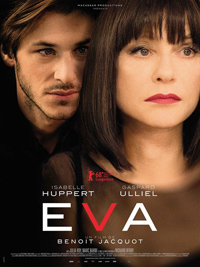All About Eva: Jacquot Remounts Losey with a Haughty Huppert
 “Don’t get hooked,” she warns of her much younger lover. But by the time she even comes around to promoting the usual preamble she presents her clients, it’s often too late for the men enamored with the titular Eva, a wealthy socialite moonlighting as a high-class hooker in a Black Widow wig masquerading as a sort of riff on Bunuel—perhaps a Belle De Nuit. Benoit Jacquot reunites with his favored muse Isabelle Huppert for the sixth time in this remake of the 1962 Joseph Losey novel which famously starred Jeanne Moreau (albeit half Huppert’s age when she donned the role of this cynical, bitter man-eater, released the same year as her iconic presence in Jules & Jim). Huppert revels in this dominatrix dress, and fans of her particular brand of icy, formidable gaze will drink up the bitchy schadenfreude with which she treats many of her clients in this new take on pulp writer James Hadley Chase’s 1945 novel, Eve.
“Don’t get hooked,” she warns of her much younger lover. But by the time she even comes around to promoting the usual preamble she presents her clients, it’s often too late for the men enamored with the titular Eva, a wealthy socialite moonlighting as a high-class hooker in a Black Widow wig masquerading as a sort of riff on Bunuel—perhaps a Belle De Nuit. Benoit Jacquot reunites with his favored muse Isabelle Huppert for the sixth time in this remake of the 1962 Joseph Losey novel which famously starred Jeanne Moreau (albeit half Huppert’s age when she donned the role of this cynical, bitter man-eater, released the same year as her iconic presence in Jules & Jim). Huppert revels in this dominatrix dress, and fans of her particular brand of icy, formidable gaze will drink up the bitchy schadenfreude with which she treats many of her clients in this new take on pulp writer James Hadley Chase’s 1945 novel, Eve.
Losey’s original 1962 version ended up being a bit of a troubled production due to the producer’s taking it out of his hands (a longer director’s cut does exist, however). In this first version, Eva takes place in Vienna, where a befuddled Welshman played by Stanley Baker gets taken by Moreau’s manipulative femme fatale, with fiancée Virna Lisi ending up as collateral damage. Jacquot switches up Chase’s prose even further (the original text is set in Hollywood) by relocating to France wherein a young gigolo, Bertrand (Gaspard Ulliel) is on hand to witness the last dying breath of an elderly client, a once renowned British playwright who has just completed his first manuscript in decades, a comedy titled Passwords.
Scooping up the printed text and tossing the laptop into the river, presto chango, Bertrand is suddenly the talk of Paris with his hit play, and so a set-up reminiscent of the recent Pierre Niney led A Perfect Man (2015) would seem to be staged. Enter the enigmatic Eva (Huppert in full-blown snide tigress mode), who breaks into Bertrand’s remote cabin one snowy night with a client. It’s a rather unpleasant (and violent) meet-and-greet, but the young man is intrigued, and so makes an aggressive move on the raven-haired seductress upon running into her at a casino. Mostly as way to distract himself from the inevitable as his publisher (Richard Berry) pushes for another manuscript, Bertrand dives headlong into pursuit of Eva, using their heated exchanges as the literal new scenes of his play, a secretive development which is beginning to wear on fiancée Caroline (Julia Roy). Eventually, the charade must come to an end.
The stark contrast with the Losey film is the sympathetic leverage allowed Huppert’s sultry seducer this time around. She’s outfitted with a rather sympathetic back-story, one which allows her a full range of complexities (though so fresh after her lauded turn in 2016’s Elle might earn some comparisons with the troubled Eva, including her collection of S&M related accoutrements) an agenda which makes her irrational, over-the-top thirst for cash much more meaningful.
Huppert gets several choice sequences exemplifying her aptitude for withering stares and edgy impatience (when pressed for a surname, she gets a great double take with an agog avowal that seems almost subconscious). Yet, she’s allowed a certain playfulness with Ulliel not usually present in her pantheon of sexual provocateurs, nicely played in a dinner sequence at a high-class establishment where they drink a bit too much (keep in mind, a decade ago Ulliel portrayed Huppert’s son in Rithy Panh’s 2008 The Sea Wall). Likewise, Ulliel’s Bertrand is granted some interesting pathology as an ex-sex worker whose fascination with Eva is partly discovering what exactly she’s hiding beneath her stoic veneer. A tender sequence with Berry is another example of a character much more multi-faceted than Moreau’s characterization, who was presented merely as an agent hell-bent on devouring men.
Another bit of interesting casting is Julia Roy, who starred in Jacquot’s 2016 adaptation of the Don DeLillo novella The Body Artist (re-titled Never Ever for the film), a production originally slated to star Huppert under the guiding hand of Luca Guadagnino—here, Huppert, along with everything else on screen, is the all-consuming organ.
While Losey’s version featured a jazzy, staccato soundtrack, composer Bruno Coulais supplies a score dripping with predatory menace. But it’s DP Julien Hirsch (Pascale Ferran’s Lady Chatterley, 2006) who really lends a sensual edge to the proceedings, making this a true homage to its leading lady, who once again, proves desire has no expiration date. As many auteurs have similarly molded Huppert throughout her extensive filmography, Eva is another exotic testament to her abilities.
Reviewed on February 17th at the 2018 Berlin International Film Festival. Competition. 102 Mins.
★★★½/☆☆☆☆☆


